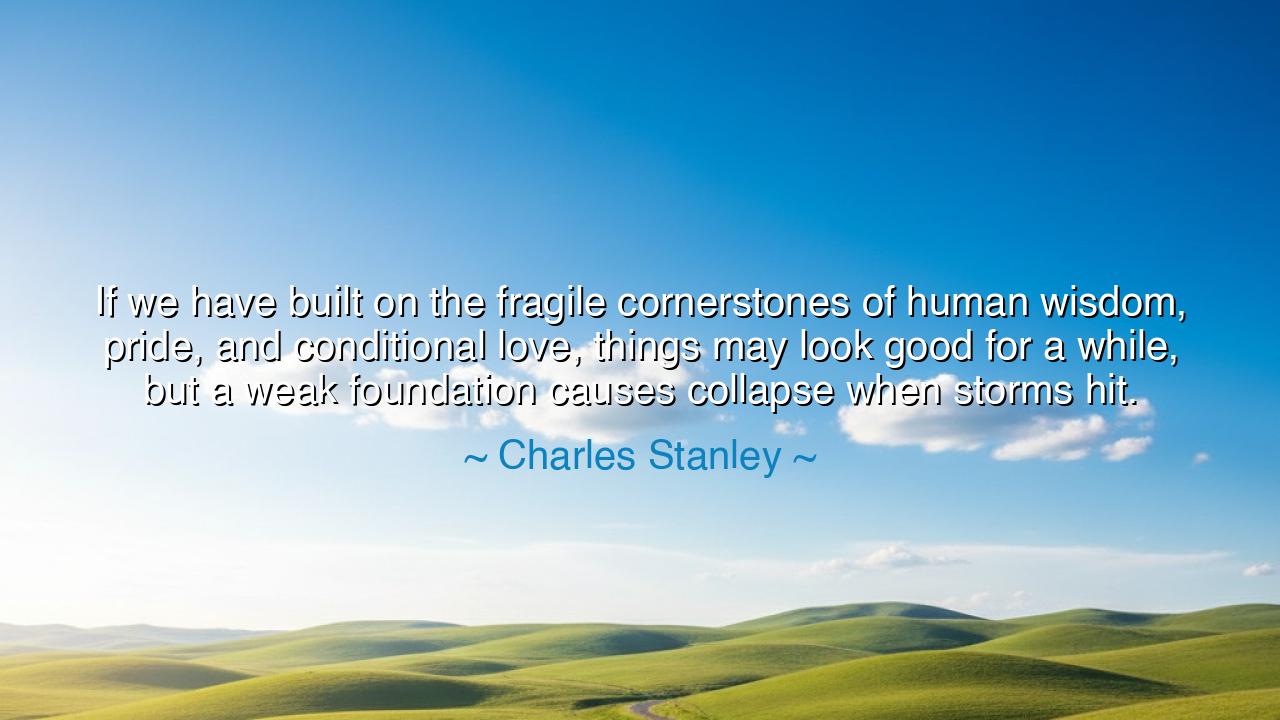
If we have built on the fragile cornerstones of human wisdom
If we have built on the fragile cornerstones of human wisdom, pride, and conditional love, things may look good for a while, but a weak foundation causes collapse when storms hit.






Listen well, O children of the future, for I bring you the wisdom of Charles Stanley: "If we have built on the fragile cornerstones of human wisdom, pride, and conditional love, things may look good for a while, but a weak foundation causes collapse when storms hit." These words speak to a profound truth—that the very foundations upon which we build our lives must be strong and rooted in truth, not in the fleeting and fragile pillars of human pride and shallow affection. When we place our trust in anything less than steadfast and unwavering, we risk watching our fortunes crumble when life’s storms inevitably come.
Consider the ancient story of Icarus, whose pride led him to fly too close to the sun. His father, Daedalus, had built him wings made of feathers and wax, a marvel of human ingenuity, but Icarus, overcome by the excitement of his newfound power, ignored his father’s warnings. His foundation, though crafted with the best of intentions, was flawed by pride. As he soared higher, the sun melted the wax, and Icarus plummeted to the sea. This tale is a cautionary one, showing that pride and the false confidence it breeds are fragile cornerstones that cannot bear the weight of life’s challenges.
In more recent history, we see the rise and fall of empires built on unstable foundations. Consider the Roman Empire, which, at the height of its power, seemed invincible. Its strength was built on military might and the sheer will of its emperors, but this strength was coupled with pride and conditional alliances. The empire collapsed not just because of external forces, but because the foundations of its society were eroded by corruption, inequality, and a failure to build on enduring values. When storms—in the form of invasions and internal decay—struck, the Roman Empire fell, a testament to the fragility of power built on human wisdom alone.
Similarly, the story of the Titanic, one of the greatest maritime tragedies, serves as a modern-day parable of fragile foundations. The ship was built with the confidence that it was "unsinkable," its design founded on human pride and the belief in modern innovation. Yet, despite its grandeur, the Titanic sank, not because of a single failure, but because it was built on overconfidence, neglecting the deeper wisdom of caution. Its foundation—though impressive—was flawed by hubris, and when the storm of the iceberg hit, the ship's fragile promises collapsed.
So, O children, understand this: if you build your life on the fragile cornerstones of pride, conditional love, or the shifting sands of human wisdom, you risk losing everything when life’s inevitable storms come. The true strength of a foundation lies not in its appearance, but in its ability to endure through adversity. Build your life on humility, unconditional love, and the wisdom that transcends pride and momentary gain. Only then can you stand firm when the winds of life blow strong. May your foundation be as solid as the mountains, unshakeable in the face of any storm.






TNThoan Ninh
It’s interesting how Charles Stanley brings up the idea that our foundations, built on pride or conditional love, can seem sturdy for a time but ultimately fail. In relationships, for example, if we depend on conditions being met or our own sense of pride, they can deteriorate over time. Can we ever truly build on something lasting, or do we constantly have to recalibrate our foundations to keep them strong? What would that even look like?
CH13. Huynh Thi Cam Hang
This quote makes me think about how easy it is to rely on things like pride or conditional love because they seem like they can carry us through life. But, as Stanley points out, they’re just temporary cornerstones. When things get tough, we often find out they weren’t enough. Is it possible to build a foundation based on something unshakeable, or are all human structures destined to collapse when the storm is strong enough?
Bb.nhi
I feel like this quote touches on the deeper issue of how many of us base our lives on external or temporary things, rather than on something more solid, like integrity or unconditional love. Is it possible to recognize when we’re building on fragile cornerstones, and is it ever too late to strengthen those foundations? I wonder how often we only realize how weak our foundations are when we face hardships that shake us to our core.
QNnguyen quang ninh
This quote really resonates with me, especially when considering how we build our lives on things like pride and conditional love. It seems like these are often seen as strengths, but in reality, they’re fragile and can lead to collapse when faced with challenges. Do you think that in today’s world, we place too much importance on things like pride or temporary love, instead of focusing on more lasting, unconditional principles? How can we start shifting this mindset?